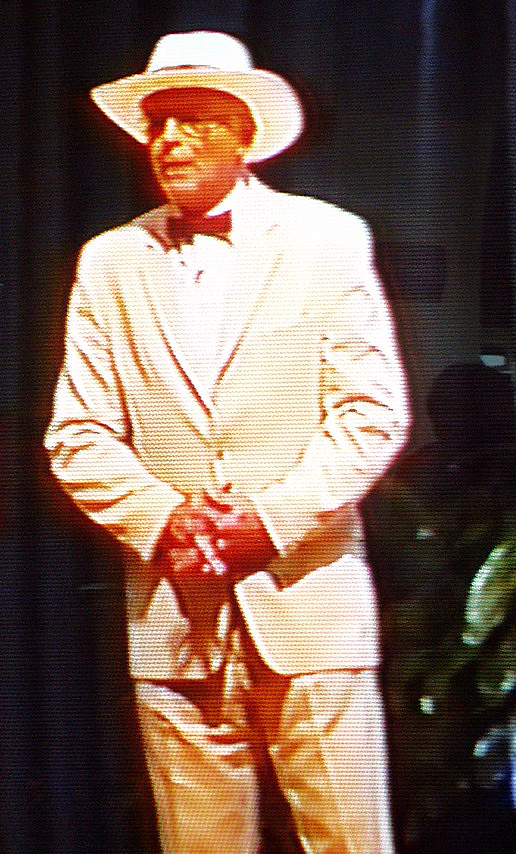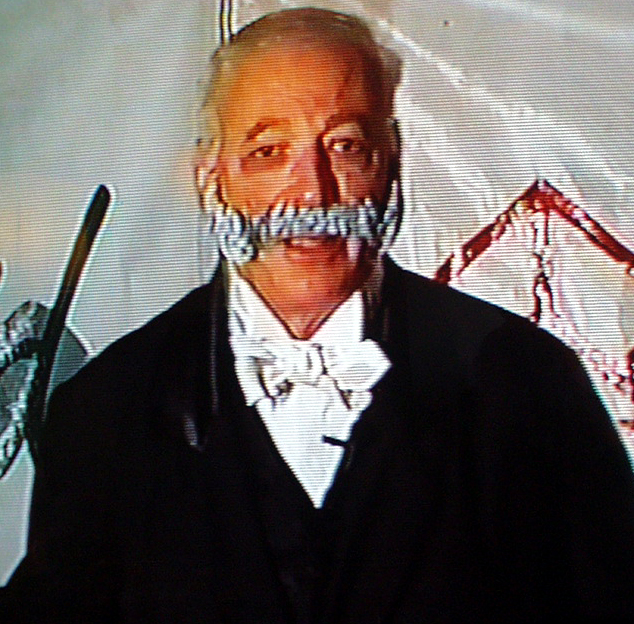|
By Donald H. Harrison
Prof. Noel Pugach has been teaching American and Jewish history at the
University of New Mexico for nearly four decades, and is the first to admit that
any good lecturer needs to have a bit of the performer in him—or, dare I say
this about a fellow Jew—be something of a "ham." But Pugach
has raised his level of theatrics to an art, and appears around the
country in one-man portrayals of such figures in American history and
literature as President Harry S. Truman, Rabbi Isaac Mayer Wise, Lew Wallace and
John Steinbeck.
 Unlike
actors who memorize scripts, Pugach draws on his own intensive research in
history, biography and literature to become that person on stage—first giving
a talk in which the subject tells about the high points of his life, and then
testing his wits by taking questions from the audience while remaining in
historical character. For people who love history, the combination is
compelling. Pugach packs a lot of information and anecdotes into his
lectures, and obviously enjoys sparring with audiences, who sometimes dispute
him. Unlike
actors who memorize scripts, Pugach draws on his own intensive research in
history, biography and literature to become that person on stage—first giving
a talk in which the subject tells about the high points of his life, and then
testing his wits by taking questions from the audience while remaining in
historical character. For people who love history, the combination is
compelling. Pugach packs a lot of information and anecdotes into his
lectures, and obviously enjoys sparring with audiences, who sometimes dispute
him.
For example, during one portrayal of Truman, a man in the audience gave
"Harry" hell about his account of his famous meeting at Wake Island
with General Douglas MacArthur. The man indignantly told the Truman on
stage that it wasn't true that MacArthur had kept him waiting, and he ought not
be telling such a story. The Truman character vigorously defended himself,
saying everyone who had been at Wake Island would back up his story.
Pugach as Truman
At the end of his presentation, however, Pugach took off
his hat, and said he now wanted to step out of character. The questioner was
correct to doubt the veracity of Truman's account, he said, but that was the way
Truman told the story, and he, as Truman, had to stick to it. But as a
historian, he knew that there were other versions of the story.
Viewing his portrayal of Rabbi Isaac Mayer Wise (1819-1900), I found
myself impressed by the depth of Pugach's research. There are far fewer
sources about Wise than there are about Truman, but the history
professor was able to bring this seminal figure in American Reform Judaism to
life. As Wise, he introduces himself as "an American of the Jewish
faith" and carefully sets out his positions on a number of controversies
that raged in 19th Century Judaism.
 Wise
felt Orthodox Judaism lacked decorum in its prayer, and believed the cantors who
led Orthodox congregations in the United States to be "ignorant
men." As an American rabbi, he made it a point to shorten services and
to speak out on issues of the day. After being ousted from one pulpit in
Albany, he started another congregation in which he instituted "the family
pew," where men and women could sit at services together. He
predicted that women one day would preach from Jewish pulpits. He also
began holding Friday night services to provide an opportunity for Shabbat
worship for those who worked on Saturdays. Wise
felt Orthodox Judaism lacked decorum in its prayer, and believed the cantors who
led Orthodox congregations in the United States to be "ignorant
men." As an American rabbi, he made it a point to shorten services and
to speak out on issues of the day. After being ousted from one pulpit in
Albany, he started another congregation in which he instituted "the family
pew," where men and women could sit at services together. He
predicted that women one day would preach from Jewish pulpits. He also
began holding Friday night services to provide an opportunity for Shabbat
worship for those who worked on Saturdays.
Pugach as Rabbi Wise
At the same time as he was changing the established order of Jewish worship,
Wise also was making "many non-Jewish friends," including New York
state senators who elected him their chaplain, and President Zachary
Taylor, who made the "Jewish trivia" books by being the first President to greet a
rabbi at the White House.
Wise published a Jewish newspaper, American Israelite, both to spread his
views and to defend the Jewish community against attack. He was a strong
supporter of the doctrine of Separation of Church and State, and was a leader in
a campaign in Cincinnati, where he spent 45 years of his life, to resist having
Bible readings in the public schools. In addition, Wise was the main force
behind the creation of the Union of American Hebrew Congregations, the Hebrew
Union College, and the Central Conference of Rabbis. He also created an
American-style Jewish prayer book, Minhag America.
Today, some of his positions may seem surprising. He opposed Zionism
on the grounds that he believed Judaism should become an international religion
rather than a religion tied to one nation. He also was dismissive of
Darwin's Theory of Evolution in that it contradicted the notion that God created
man separately. On the biggest issue of the day, the abolition of slavery, he
declined to be drawn into the debate.
Pugach's portrayal of Harry S. Truman also treats some Jewish issues. He tells how when he was still a U.S. senator he criticized
President Franklin D. Roosevelt for not doing more to help Jews and other
victims of Hitler. He provides the background for the decision to cast the
U.S. vote at the United Nations in November 1947 for partition of
Palestine, and goes on to talk about all the pressure he was subjected to by
both sides concerning whether or not the United States should recognize the
Jewish State. On the one hand, Zionists including Rabbi Stephen
S. Wise (1874-1949) called for recognition; on the other hand were allied the
oil companies, Great Britain, the Joint Chiefs of Staff of the U.S. Military
service, and the U.S. State Department.
The Pugach Truman explained that the effects of the Holocaust weighed
heavily in the decision; he knew that the Jews who were living in
Displaced Persons Camps could never return to their former homes in
Europe. He dismissed the charge that he took a pro-Israel stand in order to win the
"Jewish vote," pointing out that in the subsequent successful 1948
presidential election against New York
Gov. Thomas Dewey, he lost the electoral votes of New York State—then, as now,
the state with the largest Jewish population.
Far more important than Jewish domestic votes, he said, was being able to woo
the Jews of Palestine to the American cause. He said he was quite concerned that
the Soviet Union would also try to recruit them as allies in the Cold War which
was then
reshaping the post World War II globe. At the time, he added, neither side
considered the Arabs to be reliable allies.
The presentation also told of Truman's friendship during World War I with Eddie
Jacobson, a Jew with whom he later opened a financially unsuccessful
haberdashery store in Kansas City, Missouri. The two men became life-long
friends, and although Pugach didn't mention the fact in the videotaped version
of his Truman performance that I saw, Jacobson would play an important role in
persuading Truman to discuss the Middle East with Chaim Weizmann, who later
became Israel's first president.
In a post-performance interview included with the
non-commercial Truman video, Pugach said he has five criteria for deciding which
historical subjects to portray. They should have made a mark in the world, there
should be plenty of information available about them; "I have to like
them;" there has to some humor in the story, and "they have to have
something to say."
While it is not a requirement for the subjects he selects, Pugach likes, when
possible, to be able to tell some Jewish story about the subject.
Wallace's famous fictional character, Judah Ben-Hur, was a Jew who furiously fought the
Roman overlords in the Holy Land, and who ultimately embraced the Christian
message of forgiveness. Wallace developed the famous story before he traveled to
the Middle East. According to Pugach, he was able to craft an amazingly accurate depiction of the
landscape of the Holy Land by interviewing travelers.
When Wallace did go to the Middle East, as U.S. minister to the Ottoman Empire,
he interceded in behalf of early Zionists who were seeking permission to live in
Palestine. He also spoke out against the persecution of Jews in
Romania.
Pugach weaves such Jewish tidbits into the overall Wallace narrative that deals
with other aspects of his career, including Wallace's support for the Mexican revolution of
Benito Juarez, his Civil War generalship for the Union, his service on the
tribunal in the war crimes trial of Confederate Capt. Henry Wirz (the
commander of the south's infamous Andersonville Prison); his encounter with the
outlaw Billy the Kid, and his term as governor of the New Mexico territory.
Likewise, Pugach found a bit of Jewish seasoning for his
portrayal of novelist John Steinbeck, telling briefly about the writer's trip to
Israel where he was shown around Masada by archaeologist Yigal Yadin. Steinbeck sent columns to Newsday on his impressions of the Holy Land.
With both American history and Jewish history as areas that Pugach knows well,
the professor finds himself attracted to stories in which his two interests converge. His
personal story is of an American Jewish boy with Orthodox grandparents, and
less observant parents—until a day that his mother agreed to let his grandmother
kasher the kitchen. Pugach attended the Brooklyn Talmudical Academy
one class behind future Harvard Law School Professor Alan Dershowitz, but resisted suggestions that he continue onto
Yeshiva University. Instead, Pugach did his undergraduate work at
Brooklyn College, and "got out of New York" to do his graduate studies
at the University of Wisconsin.
Approaching his 67th birthday, which will fall on Passover, Pugach is planning
to retire after this, his 38th year, as a professor at the University of New
Mexico. "Retirement!" he laughs, knowing that he will most
likely transfer his teaching from the university classroom to the stages of
auditoriums and Chautauqua tents across the country, where performers
impersonating historic figures—and even dialoguing and debating each
other—are a popular form of entertainment.
The performance as Rabbi
Isaac Mayer Wise that I saw had him being introduced by a character playing the
American author and philosopher Henry David Thoreau. At other times his
Truman has had lively debates with another impersonator's MacArthur.
Ever the teacher, Pugach also instructs Reform Jews of
Albuquerque's Congregation Albert—New Mexico's oldest Reform temple—
in studies of biblical texts. He recently completed a class on the
Book of Ruth. He utilized not only classical rabbinical scholarship to analyze
the story of Judaism's most famous convert, but also incorporated sources from
feminist literature and from archaeological expeditions to Moab, located in
modern-day Jordan. His own affiliation is with Chavurat HaMidbar, which
he describes as "one of the oldest independent Chavrot in the U.S..
"We have about 80 units—some single, more married, a couple of gays and
lesbians. We are traditionally oriented, (we use a traditional prayerbook) and
Zionist, but open, egalitarian, somewhat experimental,
democratic, totally lay led. We function though organized chaos. A very
interesting group. We were formed in 1973."
Pugach may be reached by telephone at the University of New
Mexico at 505-277-2701or via email, npugach@unm.edu.
.
|

